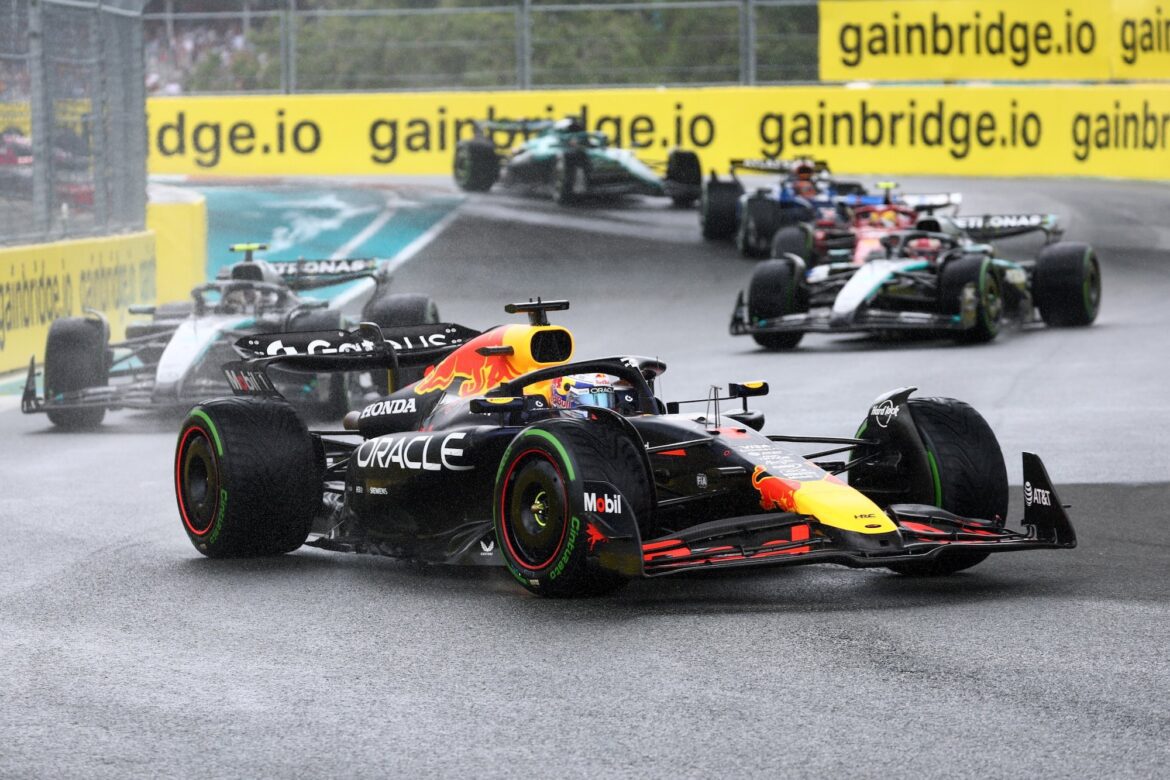After being outpaced by Oscar Piastri and Lando Norris from McLaren, as well as George Russell from Mercedes, during the Miami Grand Prix, Max Verstappen acknowledged the impressive performance of McLaren. He believes that there are still opportunities for victory in races where overtaking is more challenging. Verstappen, who started from pole position last weekend, ultimately finished in fourth place, nearly 40 seconds behind the winner, Piastri. This result highlighted the considerable performance gap between Red Bull Racing and McLaren at this stage of the Formula 1 season.
Verstappen praised McLaren’s performance, particularly their tire management skills. He stated, “It’s not just the pure performance of the car; their tire management is incredible.” This comment underscores the importance of not only raw speed but also strategic thinking during races. When asked about the potential for Red Bull to catch up to McLaren by resolving the balance issues of their RB21 model, Verstappen was cautious. He pointed out that Red Bull has been struggling with tire overheating, which has been a significant limiting factor.
Nevertheless, the four-time world champion remains optimistic about the chances of competing effectively at certain venues in the calendar. “I’m looking forward to some tracks I enjoy driving. Realistically, with the advantage they have, your chances are slim. But perhaps at tracks where overtaking is difficult, you might have a shot. Let’s see what happens,” he added, hinting at a potential glimmer of hope for Red Bull.
Verstappen specifically mentioned the Monaco Grand Prix as a race where the dynamics could play in his favor, despite acknowledging that Monte Carlo has not been a stronghold for Red Bull in recent years. “Sometimes everything falls into place, but you can’t rely on that all the time,” he concluded, emphasizing the unpredictable nature of racing.
As Formula 1 progresses, the competition among teams intensifies, and the importance of strategic planning becomes even more crucial. The ability to adapt to different track conditions and manage tire performance can often be the deciding factor in a race. Teams are constantly analyzing data and making adjustments to improve their cars’ performance, focusing not just on speed but also on handling and durability of the tires.
The Miami Grand Prix showcased how quickly the landscape can change in Formula 1. McLaren’s strong performance was a testament to their hard work and development over the past seasons. The team has made significant strides, and their success in Miami serves as a clear indicator of their competitiveness this season. As they continue to refine their strategies and car setups, other teams, including Red Bull, must also evolve to keep pace.
For Verstappen and the Red Bull team, the focus will now shift to upcoming races where they hope to leverage their strengths. While overtaking may be challenging at certain circuits, the team is known for its technical prowess and ability to adapt. This adaptability will be vital in the races to come, particularly in environments where tire management and race strategy can make all the difference.
The battle for supremacy in Formula 1 is not just between drivers but also among the teams and their engineering departments. Each race presents an opportunity for teams to learn and improve, and the pressure to perform consistently increases as the season unfolds. Verstappen’s insights into the strengths of his competitors, combined with his own team’s challenges, highlight the intricate balance between talent, technology, and strategy in the sport.
As fans eagerly anticipate the next races, the tension continues to build. Teams are meticulously preparing to address any shortcomings and capitalize on their rivals’ weaknesses. The dynamics of the championship race are ever-changing, and every point is crucial as drivers vie for the title.
In the world of Formula 1, where milliseconds can define a race, the emphasis on performance is paramount. The ability to maintain tire integrity while pushing the car to its limits is a delicate dance that requires skill and precision. As Verstappen noted, McLaren has demonstrated exceptional tire management, which has clearly contributed to their current form. This factor will be essential for all teams as they head into the more demanding circuits of the season.
Looking ahead, Verstappen’s anticipation for tracks that favor his driving style is a reminder of the psychological aspect of racing. Drivers often draw motivation from their favorite circuits, where they feel most confident and in tune with their machines. This confidence can translate into performance on the track, influencing not only their lap times but also their overall race strategy.
As the season progresses, the excitement of Formula 1 builds. Each race weekend comes with its own set of challenges and opportunities. Teams will continue to analyze their performances, adapt their strategies, and push the boundaries of technology to gain an edge over their competitors. The rivalry among teams ensures that every race is not just a contest of speed but also a test of ingenuity and resilience.
In conclusion, the Miami Grand Prix served as a pivotal moment in the current season, highlighting both the strengths of McLaren and the challenges facing Red Bull and other teams. Verstappen’s reflections on the race reveal the complexities of Formula 1 racing, where strategy, tire management, and driver skill converge to create a thrilling spectacle. As the season unfolds, fans can expect to witness intense battles on the track, with teams striving for excellence in their quest for victory.
